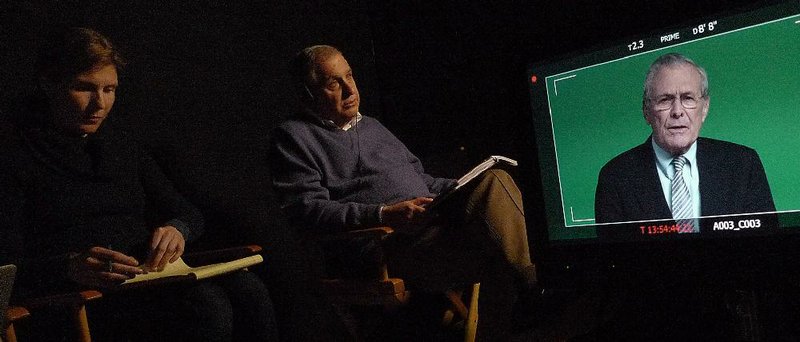“It starts for me with the interviews, but here it started with the interviews and the ‘snowflakes,’” says Oscar-winning documentarian Errol Morris.
He’s not talking about Frozen.
During a Q&A session via Skype at the True/False Documentary Film Festival in Columbia, Mo., last month, Morris told a sold-out crowd of 1,200 about what it was like to question Donald Rumsfeld, who served as secretary of defense under Presidents Gerald Ford and George W. Bush. He’s the subject of Morris’ new film The Unknown Known, which takes its title from the former secretary’s bizarre verbal gymnastics.
One key element in Morris’ quest for understanding one of the architects of the Iraq war was reviewing the memos Rumsfeld has dictated during his long career in government and corporate life. (He was CEO of G.D. Searle& Co., a pharmaceutical company.) Because of the sheer volume of the memos, Rumsfeld has dubbed them “snowflakes.” For the film, Morris convinced Rumsfeld to read some of these memos aloud.
“I became aware of the ‘snowflakes’ really before I even started interviewing Donald Rumsfeld,” Morris says. “And they fascinated me. They still fascinate me because they were a way in if you want to explore who is Donald Rumsfeld and what was he thinking or what did he want other people to think he was thinking? The snowflakes are a great place to start, particularly with a man who has written tens of thousands of them, the snowflake tsunami. A mixed metaphor of some kind, but it’s the best I can do at the moment.
“Those snowflakes are not publicly available. He gave me access to them, and since he tapes over all of his Dictaphone recordings, these are performances. He’s performing his snowflakes for the camera. That’s also something really quite interesting.”
The film also features clips of Rumsfeld charming and silencing reporters during news conferences during his time in office. Morris said he noticed something similar during his own interviews.
“There’s such an element of performance in everything that he does that I started to wonder what’s left after you subtract the performance out of all of this. Is it simply all performance? I’m not sure I have a real answer to that question. He’s certainly a man who likes to talk. He’s very, very good at talking, but if I hoped that the talk would reveal some kind of inner reflection or thoughtfulness, I don’t believe that it does.”
Morris has been a vocal critic of the Iraq war, in his Oscar acceptance speech for The Fog of War, about previous Secretary of Defense Robert S. McNamara, and in his New York Times media blog, Zoom.
While some might imagine the director spoiling for a fight, he says, “I try to exercise restraint. I try to listen, to listen respectfully. A journalist who was interviewing me just yesterday asked me, ‘Do you ever wonder if this movie was too subtle?’
“And the answer is, yes I do. I direct a lot of commercials, and I have this motto that I always truck out for commercials that subtlety is for kids because kids appreciate subtlety. Adults need a two-by-four upside the head. You’re not told endlessly what to think, but the material is there. Did I got too far? I’m never sure.”
Instead, the film reveals much about Rumsfeld, from the fact that Rumsfeld didn’t read the “torture memos” about conditions at Abu Ghraib prison in Iraq to the 1983 “Swamp Memo,” in which Rumsfeld argued persuasively against the type of Middle East intervention that marked his second term as secretary of state.
“It is ultimately a movie about absence, his refusal or inability [to apologize for] with much of anything, certainly with any of the things for which he’s responsible,”Morris says. “I sometimes think of this as a horror film. If there was something else going on, it would be far less strident, far less appalling. It’s like asking an aluminum siding salesman if he really reflects on the quality of his aluminum siding. Probably not.”
Throughout the conversation, Morris mentioned how friendly and cooperative Rumsfeld had been in agreeing to shoot more than 35 hours of interviews, but when asked about what the former secretary is doing now, the director quickly replied, “He’s over 80 now. He’s lecturing. He’s fabulously wealthy. He sits on the boards of various sundry corporations. I’m glad that he’s semi-retired.
“Would you really like to have him back in government?”
Editor’s note: See blood, dirt & angels (blooddirtangels.com) for Philip Martin’s review of The Unknown Known.
MovieStyle, Pages 33 on 04/11/2014
